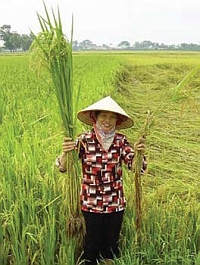Rice can become adapted to climate change by colonizing its seeds or plants with the spores of tiny naturally occurring fungi, according to new research led by the U.S. Geological Survey (USGS). The study is published online in the journal PLoS One.
Rice, according to the UN’s Food and Agriculture Organization, feeds half of the world. The agency projects some 464 million metric tons of rice to be shipped in 2011. Yet rice can also be affected by climate change or natural disasters (e.g., tsunamis), thus the importance of protecting this key part of the world’s food supply.
Seattle-based USGS researcher Rusty Rodriguez tested the strategy of strengthening rice using attributes from natural sources with which they form a symbiotic relationship. Plants have microscopic fungi or bacteria called endophytes that do not cause disease in the plant. In this case, Rodriguez introduced microscopic fungi from other plants to provide higher salt or drought tolerance to rice.
The scientists took fungal endophytes from dunegrass, a species exposed to seawater and therefore salt-tolerant, and colonized the rice plants and seeds with its fungal spores, which germinated and infiltrated the rice plant’s tissue. The results showed that the endophytes reduced water consumption of the plant by up to one half, and increased its growth, the number of seeds it produced, and how much it weighed by as much as 50 percent.
Conferring heat tolerance to rice is the next step for the research team since rice production decreases by 10 percent for every temperature increase of one degree centigrade during the rice-growing season.
“We have named this emerging area of research ‘symbiogenics’ for symbiosis-altered gene expression. The DNA of the rice plant itself, however, is not changed,” Rodriguez says. “Instead, we are re-creating what normally happens in nature.”
Read more: Research Collaboration Developing More Robust Rice
* * *


 RSS - Posts
RSS - Posts
You must be logged in to post a comment.